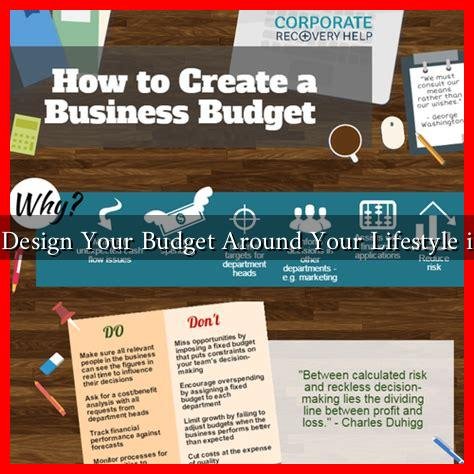-
Table of Contents
How to Design Your Budget Around Your Lifestyle in 2025
As we step into 2025, the importance of aligning your budget with your lifestyle has never been more critical. With the rise of remote work, fluctuating economic conditions, and evolving consumer habits, creating a budget that reflects your personal values and goals is essential for financial well-being. This article will guide you through the process of designing a budget that complements your lifestyle, ensuring you can enjoy life while maintaining financial stability.
Understanding Your Lifestyle Needs
The first step in designing a budget that fits your lifestyle is to understand your unique needs and priorities. This involves assessing various aspects of your life, including:
- Housing: Consider whether you prefer urban living, suburban comfort, or rural tranquility.
- Transportation: Evaluate your commuting needs, whether you rely on public transport, own a vehicle, or work remotely.
- Food and Dining: Reflect on your eating habits, including dining out versus cooking at home.
- Entertainment: Identify your leisure activities, such as travel, hobbies, or subscriptions.
- Health and Wellness: Factor in expenses related to fitness, healthcare, and mental well-being.
By understanding these elements, you can create a budget that not only meets your financial obligations but also enhances your quality of life.
Setting Financial Goals
Once you have a clear picture of your lifestyle needs, the next step is to set specific financial goals. These goals should be realistic, measurable, and aligned with your lifestyle. Consider the following types of goals:
- Short-term goals: Saving for a vacation, paying off credit card debt, or building an emergency fund.
- Medium-term goals: Saving for a down payment on a home or funding a child’s education.
- Long-term goals: Retirement savings or investing in a business.
According to a survey by the National Endowment for Financial Education, only 30% of Americans have a written financial plan. By setting clear goals, you can increase your chances of financial success.
Creating a Flexible Budget
In 2025, flexibility is key when it comes to budgeting. A rigid budget can lead to frustration and feelings of deprivation. Instead, consider adopting a flexible budgeting approach, such as the 50/30/20 rule:
- 50% for needs: Allocate half of your income to essential expenses like housing, utilities, and groceries.
- 30% for wants: Use 30% for discretionary spending, including entertainment, dining out, and hobbies.
- 20% for savings and debt repayment: Dedicate the remaining 20% to savings, investments, and paying off debt.
This method allows you to enjoy your lifestyle while still prioritizing savings and debt management. Additionally, consider using budgeting apps like Mint or YNAB (You Need A Budget) to track your spending and adjust your budget as needed.
Case Study: The Remote Worker
To illustrate how to design a budget around lifestyle, let’s consider the case of Sarah, a remote worker living in a metropolitan area. Sarah values travel and experiences but also wants to save for a home. Here’s how she structured her budget:
- Housing: Sarah rents a modest apartment in the city, spending 30% of her income.
- Transportation: She uses public transport, saving on car expenses.
- Food: Sarah cooks at home most days but allocates 15% of her budget for dining out.
- Travel: She saves 10% of her income specifically for travel experiences.
- Savings: Sarah contributes 20% to her savings and retirement accounts.
By aligning her budget with her lifestyle, Sarah can enjoy her passions while working towards her long-term goals.
Conclusion
Designing a budget around your lifestyle in 2025 requires a thoughtful approach that considers your unique needs, financial goals, and the flexibility to adapt to changing circumstances. By understanding your priorities, setting clear goals, and creating a flexible budget, you can achieve financial stability while enjoying the life you desire. Remember, budgeting is not just about restricting spending; it’s about making informed choices that enhance your overall quality of life. For more tips on budgeting and financial planning, visit NFCC.




